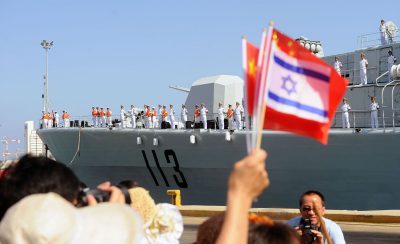China To Acquire Management Control over Israel’s Strategic Port of Haifa?
The Brouhaha Over China’s Haifa Deal Highlights Israel’s “Deep State” Divisions

China will soon operate the Israeli port of Haifa if everything goes according to plan.
Haaretz reported on a conference late last month in Israel where the former navy chief of staff and chairman of the Atomic Energy Commission Shaul Horev warned about China’s forthcoming management of the strategic port of Haifa. The deal was agreed to three and a half years ago by the Transportation Ministry and Port Authority without what the outlet claimed was the input of either the National Security Council or the navy itself, the latter of which is supposedly concerned because Israel’s submarine fleet is based next to the port. The impending implementation of the agreement has led to the usual fear mongering about “debt traps”, military implications, and oddly enough, even whether Israel is pivoting away from the US.
What’s clearly happening is that a faction of Israel’s permanent military, intelligence, and diplomatic bureaucracies – or “deep state” – wants to join China’s One Belt One Road (OBOR) global vision of New Silk Road connectivity while the other wants to retain Tel Aviv’s stalwart pro-American foreign policy by preventing this, hence the public friction over this issue. Unlike what many in the Alt-Media Community might imagine, Israel and China have become increasingly close over the past couple of years as Beijing has developed an interest in the so-called “Red-Med Railway” proposal of connecting the two bodies of water via a high-speed railway that could eventually complement the Suez Canal or possibly one day even become an alternative to it.
Israel’s agreement to allow China to expand and then subsequently manage the port of Haifa is indicative of an influential “deep state” faction’s desire to diversify Tel Aviv’s strategic dependence on the US by pragmatically cooperating with other rising Great Powers, such as what it’s been doing lately with Russia in Syria for example. Furthermore, it appears as though this faction envisions Israel fulfilling a similar role as its new partner India in the sense of “multi-aligning” between Great Powers, which could in theory allow it to leverage the newfound “competition” over its “loyalty” in order to extract better benefits from all sides, including the US.
Should the deal not be offset by any last-minute so-called “national security” concerns by the opposing “deep state” faction and its American allies, then Israel would basically be giving the Silk Road its best-ever international endorsement, which might also have been one of the reasons why China was even interested in this opportunity in the first place. There’s also the possibility, noted by Ber Cowen at The Times Of Israel, that China has long-term ambitions of controlling the East Mediterranean port of European access for Gulf resources following any future Palestinian peace deal that results in the Arab Monarchies officially recognizing Israel and building pipelines through it in order to save on upwards of 40% of the costs that they pay for transiting through the Suez Canal.
Whatever China’s intentions are – and they certainly don’t have anything to do with locking Israel into a “debt trap” or spying on its submarines – the controversy over this agreement nevertheless points to the fact that there are two geopolitically competing “deep state” factions in Israel that are now making their Haifa feud public because each of them believes for very different reasons that it could indeed be a game-changer if the deal ends up going through.
*
Note to readers: please click the share buttons above. Forward this article to your email lists. Crosspost on your blog site, internet forums. etc.
This article was originally published on Oriental Review.
Andrew Korybko is an American Moscow-based political analyst specializing in the relationship between the US strategy in Afro-Eurasia, China’s One Belt One Road global vision of New Silk Road connectivity, and Hybrid Warfare. He is a frequent contributor to Global Research.
Featured image is from the author.

